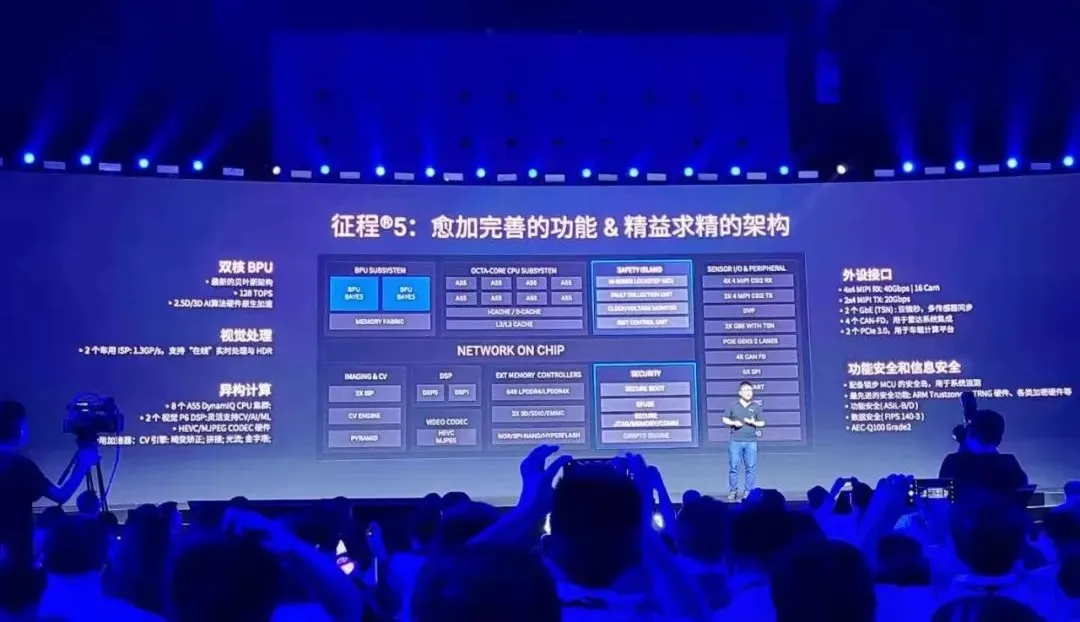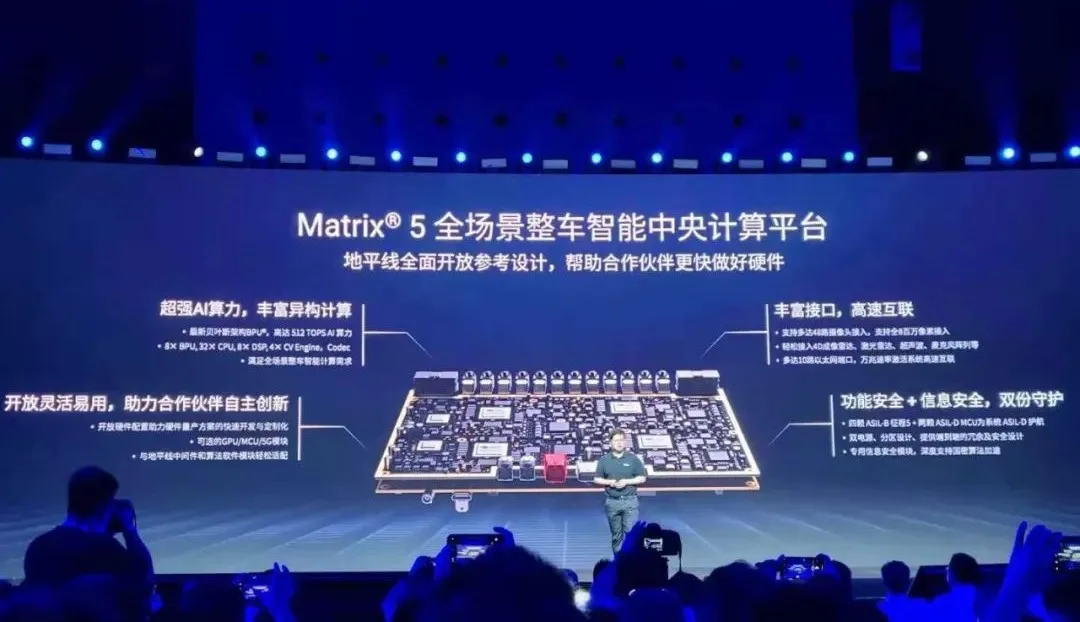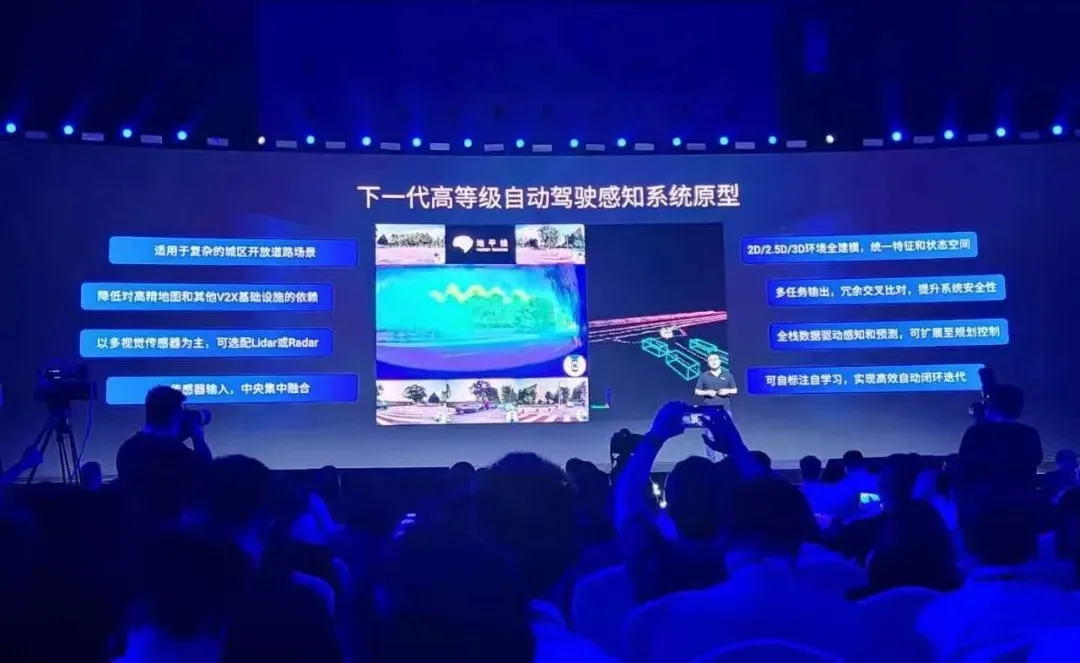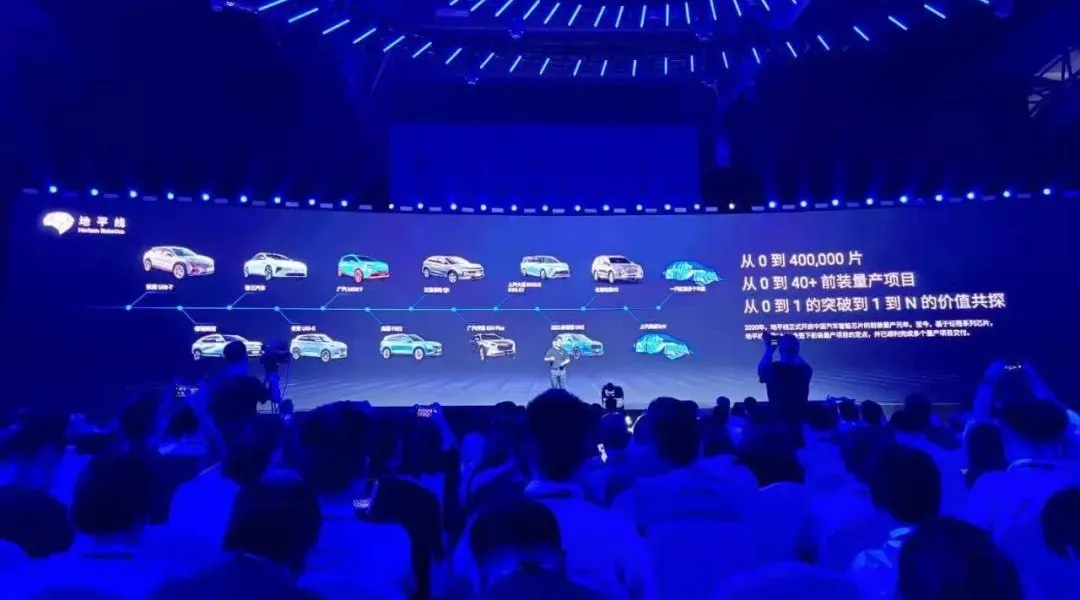“This is the most important product launch event for Horizon in 6 years.” At the Horizon high-performance and high-power intelligent vehicle platform and strategic release conference on July 29th, the first sentence spoken by the founder Yu Kai set the tone for the event.
This is because, after six years of ups and downs, Horizon has finally set its direction and launched a series of product research and development and strategic deployment based on it.
Yu Kai stated that since its establishment in 2015, Horizon has been committed to enabling every car in the world to have the ability of environmental awareness, human-computer interaction, decision-making, etc. This original intention has not changed, but the mission and vision have been adjusted slightly.
The mission has changed from “empowering everything, making everyone’s life safer and better” to “empowering machines, making human life safer and better”; the vision has evolved from “becoming the global leader of edge AI chips” to “enabling every car to be equipped with Horizon’s edge intelligent computing platform”.
In Yu Kai’s view, these changes are based on continuous product and technology implementation. It can be understood that Horizon will fully focus on the automotive field to promote the progress of chips, and even basic algorithms such as operating systems and sensors.
This also means that Horizon will do its utmost to focus on being a Chinese supplier of automatic driving chips.
On this basis, Yu Kai insisted that Horizon will always be positioned as a Tier 2 company, not doing mass-produced hardware, software bundling, or a closed packaging solution.
Debut of Four Major Products
The realization of the above vision requires the support of products. Therefore, Horizon showcased four major products at the conference.
The first is the Journey 5 chip.
Different from the previous intelligent driving and intelligent interaction chips that were in two separate systems, the Journey 5 is a full-scene intelligent central computing chip for the entire vehicle, integrating automatic driving and intelligent interaction. Its single chip AI computing power can reach up to 128TOPS; in the MS CoCo object detection test, the computing performance reached 1283FPS; the automatic driving delay is 60 milliseconds, far lower than the around 150 milliseconds delay of most products on the market; and power consumption is as low as 30W.

Previously, Yu Kai estimated that L3-level automatic driving only requires a few tens of TOPS of computing power; L4 requires hundreds of TOPS; and L5 requires thousands of TOPS. This means that with the launch of the Journey 5 series, Horizon has become a provider of whole-vehicle intelligent chip solutions that cover from L2 to L4 scenarios.The technological core of Horizon lies in the independently intellectual property BPU chip set architecture. The third-generation architecture named “Bayes” employs large-scale configurable near memory computing, highly flexible and concurrent data bridge, and pulse tensor computing kernel.
Furthermore, in order to support more partners to build hardware and software products, Horizon 5 has a rich set of hardware interfaces, heterogeneous programmable computing acceleration engines, and a comprehensive chip toolchain to support customer participation in innovation.
Secondly, Horizon 5 is the foundation of the intelligent computing platform for the whole vehicle.
Based on the Horizon 5 chip set series, Horizon has launched an automatic driving domain controller that supports up to 8 Horizon 5 chip combinations, with a maximum computing power of 1024 TOPS.
At the unveiling, Yu Kai demonstrated the reference design of the Matrix 5 computing platform. The design employs four Horizon 5 chips with a maximum computing power of 512 TOPS and is able to choose GPU, MCU, and 5G modules.
Reportedly, four Tier 1 companies, namely Continental Group, Neusoft Reach, Luxshare Precision, and Liancheng Open, have launched domain controllers based on the Horizon 5 chip set. In the future, Horizon will also work with software and hardware partners such as Desay SV, Foryou Group, Jinma Information, and Hongjing IMa to jointly build the Matrix 5 fully-scenario whole vehicle intelligent central computing platform.

Thirdly, TogetherOS™ is an open-source, safe and real-time operating system.
TogetherOS, as the name implies, is “let’s create a safe, open and open source operating system together”. Its initial mass production will be integrated into the Horizon intelligent driving chip solution.
However, TogetherOS is not only compatible with the Horizon series chip set, but also includes a variety of mainstream in-vehicle chip platforms in the industry, such as Linux, Android, Zebra, QNX, and Hongmeng. It features lightweight virtualization, multi-domain security isolation, open software architecture, and high scalability, supporting intelligent cockpit, intelligent driving, and intelligent interconnect applications in multiple scenarios.
The first batch of ecological partners for TogetherOS includes AutoCore, Zebra Zhixing, Changan Automobile, Great Wall Motor, Jiang Motors Group, SAIC Group, and Chery Lion Technology.
Fourthly, Matrix® SuperDrive is a whole vehicle intelligent solution.# Matrix® SuperDrive Intelligent Solution
Matrix® SuperDrive is an intelligent solution for the whole vehicle equipped with full-scenario autonomous driving and in-car/out-car interconnection experience. It is based on Matrix®5 hardware reference design and compatible with partner hardware, covering high-speed autonomous driving, complex urban scenarios, low-speed parking scenarios, intelligent interaction scenarios, and the overall intelligent scenario.
It emphasizes on strong redundancy, high safety, and excellent user experience. It will support a rich and comprehensive sensor system to complete the whole vehicle intelligence from perception, localization, prediction, planning to cabin interaction. It will leverage the 512 TOPS computing power and abundant computing resources in the Matrix®5, and make different designs based on different scenario needs and positioning for different vehicle models.

During the event, Horizon also showcased the prototype of the next-generation high-level autonomous driving perception system, which is a pure visual perception system with only six cameras mounted, and the system is reportedly in the internal testing phase. In the future, other sensors, such as LiDAR, can be added according to customer needs.
According to Horizon’s prediction, a demonstration of urban autonomous driving will be launched in the fourth quarter of this year, and partner domain controllers hardware will be mass-produced in the second quarter of 2022. The SuperDrive solution will be mass-produced SOP in the fourth quarter of 2022.
Building an Open Eco-Strategy
Product launch events naturally come with partner collaboration, but rarely does a company spend nearly half of the time in two parts introducing partners.
The first part is about automakers. Starting from June last year, after Journey 2 chips were mass-produced on Changan UNI-T vehicle, Horizon’s cooperation with automakers has been increasingly strengthened. As of now, it has delivered more than 400,000 automotive-grade chips, owns more than 40 front-loading mass-production projects, and has signed front-loading mass-production project agreements with more than 14 automakers.
Currently, Horizon’s partners are mainly Chinese brands, and the models carrying Horizon’s Journey series of chips publicly announced include Changan UNI-T, UNI-K, Chery Ant, IM L7, GAC Aion Y, GAC Trumpchi GS4 Plus, Landtour FREE, Sihao QX, 2021 Ideal ONE, etc.

During the event, some executives of the above-mentioned automakers came on stage to support and talk about the next cooperation plan.The Great Wall has completed the journey with the Journey 2 chip being applied to the 2022 Haval H9 model, and a co-operative project based on Journey 3 is currently being negotiated and will explore the use of Journey 5 in Great Wall vehicles in the future. SAIC Roewe will install the Journey 3 chip in the RX5 model next year, while a number of models from FAW Hongqi will carry the Horizon chip next year. NIO has announced that all existing models are now in the process of mass production with the Journey 3 chip, while the Journey 5 chip is still in pre-research.
The second part introduces relevant supply chain companies. According to reports, Beidou Star Sky Intelligent Interconnection Technology is a mass production partner for the Journey 2 chip intelligent interaction and has already begun developing the Journey 3 product. Cathay Pacific Group’s targeted intelligent mutual project with Horizon will be in mass production by the end of this year, while Continental Group will set up a joint venture with Horizon to develop cutting-edge technology in the field of visual perception. Dongsoft Ruichi and Horizon have launched a series of partnerships based on Journey 2, Journey 3, and Journey 5, providing OEMs with intelligent solutions…
Behind this series of interactions is Horizon’s desire to create an open ecological strategy, positioning itself as the bottom layer of China’s intelligent automotive ecological chain, and has provided its ecological commitment: more powerful technical support, more comprehensive service dimensions, and more collaborative business expansion.
In order to achieve openness and open source, Horizon will provide an AI development toolchain – Horizon Open Explorer, a full-chain development platform for Tian Gong Kai Wu, as well as a platform for intelligent automotive AI software tools – Horizon Eddie, providing AI training, testing, management, and other tools. It will help improve the algorithm R&D efficiency of partners by automating the full process of key scene problem mining, model iteration, and open docking with various terminals.
According to the “Hundred-Thousand-Billion” partner development plan of Horizon’s ecosystem, the company promises to invest over one billion yuan annually in the partner development plan, supporting the development of over a hundred partners and radiating over a thousand ecological nodes.
These moves reflect Horizon’s desire to seize the “opportunity for the centennial transformation of the automotive industry.” During the Shanghai Auto Show this year, Yu Kai said in an interview with the media that there will be very few winners in the chip industry, perhaps only one or two, and the top-ranked competitor will have a huge advantage over the second-ranked company. At this press conference, Yu Kai reiterated that the chip industry has been likened to the World Cup and that his goal is to become the champion.Horizon previously expected that Journey 5 would be mass-produced and put into operation in the second half of 2022. At that time, the main chips supporting high-level autonomous driving on the market were: Nvidia’s OrinX, Qualcomm’s SA9000A/B, and Huawei’s Ascend 610.
This also means that Horizon is facing direct competition with the three major companies: Nvidia, Qualcomm, and Huawei.
In terms of computing power and power consumption, Nvidia’s OrinX has a maximum AI computing power of 254TOPS and a power consumption of about 40W; Qualcomm’s SA9000A/B has a computing power of 200/300TOPS and a power consumption of 40/60W; the Ascend 610 has a computing power of 160TOPS.
From the data perspective, Journey 5 is not weaker than other companies. However, from the perspective of the company itself, the reputation, capital, and other strengths of Nvidia, Qualcomm, and Huawei are far greater than those of Horizon.
To gain a foothold among the big players, Horizon clearly needs to make special efforts while ensuring product quality. Openness is a great tool.
Previously, Yu Kai stated that Horizon is more open and universal compared to some chip companies. All chips allow customers to program on them, and can be used for both intelligent interaction and intelligent driving.
This is also the reason that impressed Ideal Auto and other companies. At the Ideal ONE launch event in 2021, Li Xiang, the founder of Ideal Auto, stated that Horizon is the most cooperative and professional chip supplier team he has ever seen. At that time, Horizon participated deeply in the development of the new car and provided comprehensive technical support and services including dual Journey 3 chips, underlying software, and application software development.
However, this clearly cannot defeat companies like Nvidia.
Therefore, Horizon proposed a more open and open source strategy, hoping to join hands with more supply chain partners and win more car enterprise customers. This is also the reason for the hour-long conversation between Horizon and various companies at this press conference, thanking the past and hoping for the future.
“Achieving customers, enduring loneliness.” Yu Kai said that this is Horizon’s core value. He believes that self-interest and altruism are unified. He believes that only by creating an open innovative system can the innovation speed of the whole industry be faster and the world be better.
Whether Horizon can “win the championship” needs time to prove. But in the current domestic auto industry, a chip company like Horizon is needed, and it needs more peers as partners.
This article is a translation by ChatGPT of a Chinese report from 42HOW. If you have any questions about it, please email bd@42how.com.
